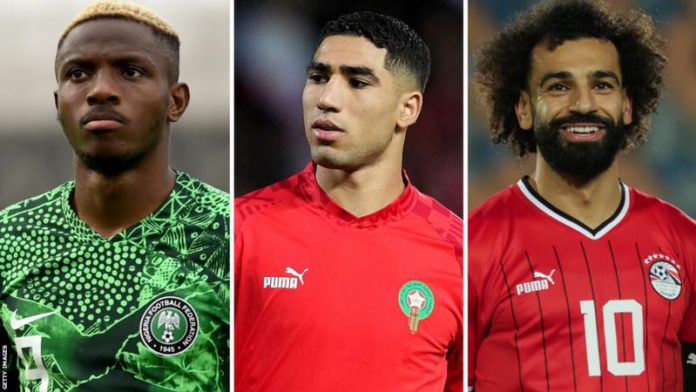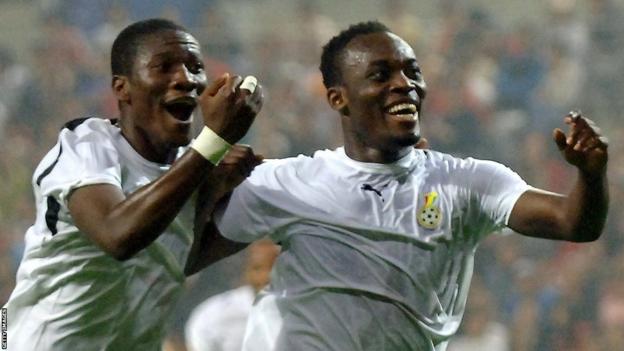
Nigeria striker Victor Osimhen is regarded as the front-runner to be named African Footballer of the Year on Monday, but the Napoli man faces competition from Liverpool forward Mohamed Salah and Paris St-Germain defender Achraf Hakimi.
Egypt captain Salah won the Confederation of African Football (Caf) award in 2017 and 2018 – and was runner-up to Sadio Mane in 2019 and 2022 – while right-back Hakimi played a crucial role in Morocco’s historic run to the semi-finals at the 2022 Fifa World Cup.
Yet Osimhen was the highest-ranked African player in the 2023 Men’s Ballon d’Or vote, finishing eighth after scoring 26 goals last season to help Napoli to their first Serie A title in 33 years.
But, should he be overlooked, the 24-year-old will join a long list of illustrious players who failed to win the biggest individual prize on the continent.
BBC Sport Africa profiles some of the other big names from across the continent who missed out on the Caf award.
Jay-Jay Okocha (Nigeria)
Regarded as one of the best dribblers in the history of the game, Super Eagles midfield maestro Okocha made the Caf shortlist three times.
He was a central part of Nigeria’s golden generation which won the 1994 Africa Cup of Nations (Afcon) and the gold medal at the 1996 Olympic Games, beating Brazil and Argentina on the way.
Okocha’s brightest moment was at the 1998 World Cup in France, dazzling with his dribbling skills as Nigeria exited in the round of 16, but he narrowly missed out to Morocco’s Mustapha Hadji at the Caf awards that year by just two points.
He was again named on the shortlist in 2003 and 2004 but finished third on both occasions, with Cameroon’s Samuel Eto’o gaining the prize despite Okocha finishing as joint top scorer and man of the competition at the 2004 Afcon.
Meanwhile, former Chelsea midfielder John Obi Mikel took second place in 2013 while ex-Everton striker Daniel Amokachi rounded off the podium in both 1995 and 1996.
Michael Essien (Ghana)

Another mercurial midfielder from West Africa, Essien was combative in the middle of the park and had a knack for scoring spectacular long-range goals.
Essien won back-to-back French titles with Lyon and was named Ligue 1 Player of the Year in 2005 before joining Chelsea for a then-African record fee of £24.4 million.
The Ghana international became a key man for the Blues over the course of almost a decade at Stamford Bridge, helping the west London club win two Premier League titles, four FA Cups and the Champions League in 2012.
He made the Caf award shortlist every year from 2005 to 2009, and finished second behind Mali striker Frederic Kanoute in 2007.
Ghana’s all-time leading goalscorer Asamoah Gyan is another notable name to miss out, finishing behind Eto’o in 2010, while Bayern Munich and Black Stars centre-back Samuel Kuffour was second in both 1999 and 2001.
Mohamed Aboutrika (Egypt)
Egypt were an unstoppable force in African football between 2006 and 2010, lifting three consecutive Afcon titles. and one man at the heart of that all-conquering Pharaohs side was Aboutrika.
An attacking midfielder with an eye for goal, he was prolific for his country and for club side Al Ahly, where he won five African Champions League and four Caf Super Cup titles.
Aboutrika won Caf’s inter-club Player of the Year award four times, was named in Caf’s Team of the Year four times and was selected in the Afcon Dream Team twice.
His desire not to leave his home country for a career elsewhere may have hurt his chances of winning the major Caf award, with the closest he came being a second-place finish behind Emmanuel Adebayor in 2008.
Egypt striker Hossam Hassan also missed out over the course of his two-decade career which saw him win three Afcon titles and finish as top scorer in the 1998 tournament.
Benni McCarthy (South Africa)

Joint top scorer at the 1998 Afcon with seven goals (alongside Hassan) and a Champions League winner with Porto in 2004, McCarthy was one of Africa’s most potent strikers of his generation.
His partnership up front with Shaun Bartlett made Bafana Bafana one of the continent’s top sides and he featured at the World Cup in 1998 and 2002.
However, McCarthy missed out on selection for the South Africa squads which won the 1996 Afcon on home soil and hosted the 2010 World Cup.
Despite a trophy-laden career in the Netherlands and Portugal, McCarthy never made it onto the shortlist for the Caf award.
Elsewhere in southern Africa, Christopher Katongo was overlooked in 2012 after captaining Zambia to a shock Afcon triumph – yet the forward could console himself with being voted the 2012 BBC African Footballer of the Year, winning with more than 40% of public votes.
Seydou Keita (Mali)
The midfielder was a key part of Pep Guardiola’s dominant Barcelona side which won three consecutive La Liga titles between 2009 and 2011, having become the first Malian to represent the Catalan club after joining from Sevilla in 2008.
He won the Champions League, Uefa Super Cup and Club World Cup with Barca in 2009 and 2011, and also was included in Caf’s Team of the Year following those triumphs.
Keita was named in second place behind Yaya Toure for the 2011 award, and he went on to help Mali to third-place finishes at the 2012 and 2013 editions of Afcon.
Kalidou Koulibaly is another West African who has missed out in the individual prize, which was not awarded in 2020 or 2021 because of the coronavirus pandemic.
Now with Saudi Pro League side Al-Hilal, the centre-back captained Senegal to the Afcon title last year but saw Teranga Lions team-mates Mane and Edouard Mendy on the podium with Salah instead.
Source:
www.adomonline.com
Source link

